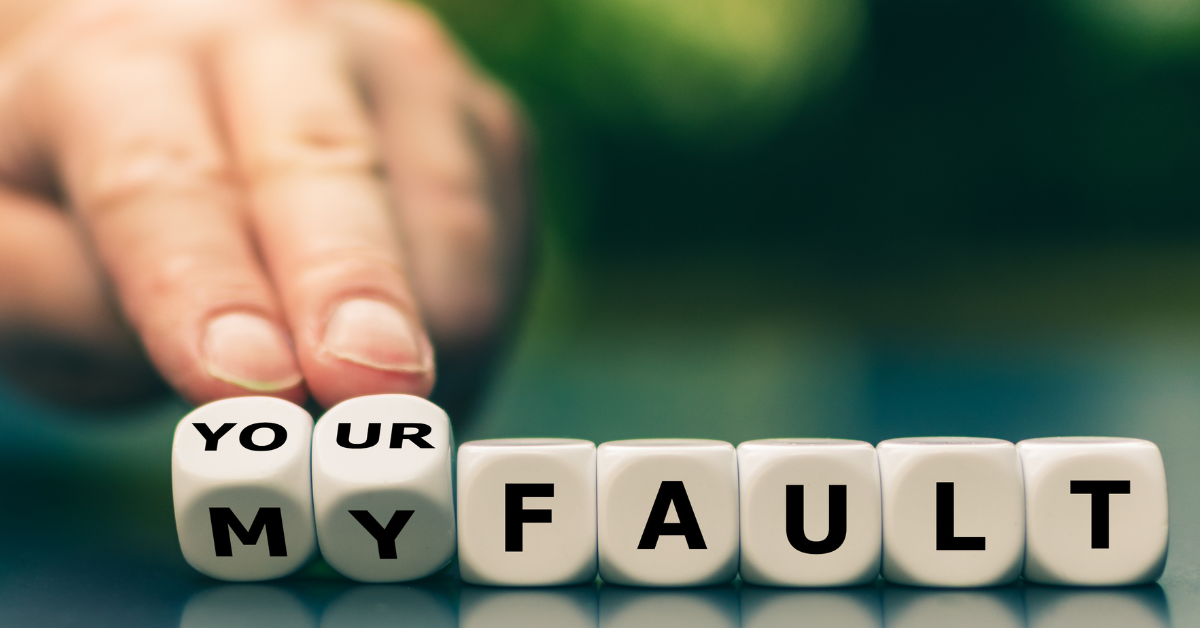Guilt trip. Is it coerced or self-inflicted?
Do you feed off others' guilt? Or let others feed off your guilt?
Guil is a natural feeling when you acknowledge some wrongdoing from you was done. But you have to pass on to the phase of learning from your mistakes and fixing what’s possible.
But it is also a tactic of emotional manipulation, you know that, right?
Do you use them? Are you a target of it? Do you really want to establish connections based on such low vibrational emotion?
Think twice because it prevents healthy communication. And healthy communication is key to a healthy relationship.
Guilt: A Low Vibrational Emotion
Guilt, along with fear, anger, grief, envy, and jealousy are some of the lowest-frequency emotions.
NO: don’t deny them. Just acknowledge and find a way how to make a mind shift.
Why? Because those are corrosive and create physical inflammatory emotions: they can literally make you sick. It is as if you were creating conditions for disease to flourish if you are systematically back and forth under those emotions’ effects.
What happens to the battery of yourself low when has a low charge? Eventually, disconnects the cellphone and get’s off function.
The same happens to us humans when our charge of emotions is set to low: we stop operating at our best level.
What happens when you are systematically…
… at mercy of fear?
… at mercy of anger?
… at mercy of grief?
… at mercy of envy?
… at mercy of jealousy?
… at mercy of guilt?
You stop operating at your best level.
You make poor decisions because you’re making calls out of overreacting.
You create physical disease because you are constantly bombarding your body with stress hormones even when they are not needed.
And when you want to find solutions to your problems you’ll want to do it at your best level. To find a sustainable solution.
And guilt is useless if it doesn’t serve a learning process followed by a coherent action.
Guilt trips: Where They Come From?
The guilt might be genuine and have reasons to exist. But it can also be, as said before, one form of manipulation of your emotions, to get some determined result.
Where can guilt trips come from? From anyone who might want to condition your behavior into some result and can’t find a better way to do so:
- Family members (parents, grandparents, siblings, or children) and friends;
- Bosses or coworkers
- Romantic partners
- Medical or mental health professionals, like a doctor or therapist
- Media Marketing
Como Reconhecer A Artimanha do Sentimento de Culpa?
It’s a skill to be able to recognize a guilt trip, because it can come from almost every environment connected to you. Including from you.
A guilt trip is a road to be avoided: because it undermines communication and gets you into toxic relationships: including the relationship you have with yourself.
So you might as well know the symptoms of the “disease” before you can actually correct the course of direction of your interactions.
These are the most commons signs of guilt tripping is being played on you (or you are playing on someone, take it how it resonates):
- Bringing sarcasm or passive-aggressive comments to arguments.
- You don’t feel free to say no, without facing severe consequences (or you induce the other person not to say no).
- You’re always the one to take the blame when something goes wrong (or you always blame the other for anything that goes wrong).
- Your love or loyalty is questioned or compared to other people (or you do this comparison)
- You’re always reminded of the work or the things that the other person did for you (or you’re the one who is always bargaining)
- Past mistakes are always brought to the table, even if the subject was already packed and delivered, even if it’s not relevant to the present situation: to make you feel like you are no good. Or you do this to the other person.
- You are being given the silent treatment (or you use this as a weapon): it doesn’t facilitate communication and it gives no opportunity to get into a win-win agreement.
- You are constantly reminded that you owe something to them, or you do this to the other person.
- You feel guilty when you think about the person.
- You avoid any contact because you suspect they will make you feel guilty.
No need to guess here: you did find some traits in you too…
Nothing to feel ashamed of: you know now that there’s room to improve, to be a better person.
Time to have some conscient behavior, now that you know what you know about yourself, now that you’ve come to the realization.
What To Do, To Avoid The Guilt Trips?
If you recognize some signs of guilt tripping in your way of acting: try telling the truth, instead of trying to manipulate results.
Tell the truth, face whatever reaction that comes, and try and find a way of agreement.
State what you want and hear what the other person has to say: find a middle way. It doesn’t have to be your way or no way. Establish functional, active communication. Relationships are not supposed to be battlefields.
If on the other hand, you feel that you are being a target for a guilt trip, you can use this, you are under attack and you have all right to defend yourself, and shield yourself off.
These are some of the self-preservation strategies:
- Keep your self-esteem strong.
High self-esteem is one of the best shields: even if, at times you tend to be your own bully, even if you are the one who does your own sabotage sometimes.
Self-esteem will keep shielded even from yourself.
If your level of self-esteem is high: you know that you deserve good things in life, you know you deserve to be well treated, and you know you are worthy. Beyond the material things.
You won’t allow anyone, not even yourself, to “punish” you for something that isn’t your fault.
And you may or may not take responsibility for fixing whatever issue that comes up: not out of guilt, but because you know that is the right thing to do for yourself.
Undermining yourself in any situation won’t make feel happy with yourself. If it doesn't make you feel good about yourself at a deep level: is no good solution.
- Stand your ground and don’t allow yourself to be bullied
What you don‘t know, you don’t know.
But what you know: make sure to stand for yourself, defend your interests and be your best friend.
We’re not talking about bringing up an issue from 300 years before, that you said you had forgotten, and are using as a weapon. No.
But if you perceive that you are coerced into some acting or behavior that does serve your best interests: don't buy into the game.
Ask for clarification, and for a clear statement of intention. If the other person doesn't appear to show the will to get into a reasonable agreement, say no. With no explanations.
"No" is also a complete sentence.
If you are not being respected enough to receive a direct truth on intent, they don’t deserve an explanation for the “no” answer.
Stand your ground and mark strong boundaries.
- Keep a healthy distance and if necessary, stop communicating with them.
If, despite your efforts, the person can only engage in conversations with you, to induce you into false guilt: maybe it’s time to protect your mental sanity, keep it intact, and stop communicating with that person.
Is simple and effective.
Abusive people who use guilt psychology, are masters of projecting emotions and creating illusions of false guilt for you to carry the feeling and for them to get whatever they want from you.
It's a mechanism they use and if it works for you… They won't stop using it.
If you already understand the strategy. There is no need to feel trapped. But you have an obligation to self-preservation. And that can sometimes mean cutting off communication and your exposure to the manipulator.
Seek Professional Help if…
… If the emotional abuser is perceived by you as being:
- A person you care about
- A person you don't want to feel bad .
Usually, they are close relationships and the person has some power over you, and eventually uses it in an abusive way.
If, for some reason, you feel that the relationship should live, then stopping communication may not be an option.
Usually, they are close relationships and the person has some power over you, and eventually uses it in an abusive way.
If, for some reason, you feel that the relationship should live, then stopping communication may not be an option.
Is then necessary to recognize the difficulty of communication, that it’s toxic and it may require a commitment – which must be mutual – to improve the relationship. It can be done by resorting to a professional.
It's your choice. It's your life.
Your best life is around the corner, after the transmutation of guilt into something useful for your personal growth.
Getting Better Every Day
Guilt Free Hugs
From Body&Soul!
Hey! I'm Eunice Veloso and you'll find more about me on my About Page
"In nature, nothing is lost, nothing is created, everything is transformed"
Antoine Lavoisier, 1789
The Law of the Conservation of Mass

